
About Andrew Cusack
 Writer, web designer, etc.; born in New York; educated in Argentina, Scotland, and South Africa; now based in London.
Writer, web designer, etc.; born in New York; educated in Argentina, Scotland, and South Africa; now based in London. read more
News
Blogs
Reviews & Periodicals
Arts & Design
World
France
Mitteleuropa
Knickerbockers
Argentina
The Levant
Africa
Cape of Good Hope
Netherlands
Scandinavia
Québec
India
Muscovy
Germany
Academica
Braai at the Dutch House
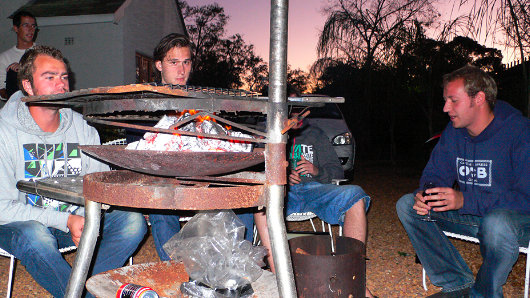
THE CUSACKIAN DICTIONARY OF the English Language defines the word braai thusly: “braai; S.Afr. [Afrikaans, lit. ‘to grill’.] n. and v. trans. and intr.; An out-door meal at which meat is grilled by the heat emanating from the embers of burnt wood.” The uncultured observer, when informed of a braai, often incorrectly equates it with a barbecue. The chief difference between a barbecue and a braai is that a barbecue tends to use either propane gas or ready-made charcoals, while the laboursome but worthwhile burning of wood is necessary to a braai.
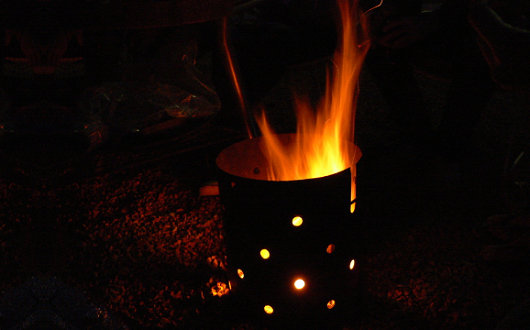
There are also some secondary conditions: a braai without meat is not a braai, and it is widely accepted that there is one hierarch (always male) who oversees and presides over the entire grilling process, occasionally dispensing others to partake in the various processes involved. It is a subject of great and furious debate among back-yard academics and lawn-furniture pundits whether the braai is a subcategory of the barbecue, or whether the barbecue is simply a deviant misapplication of the braai concept by heathen slaves of modernity from foreign lands. (The latter conclusion is more widely accepted in these parts than the former).
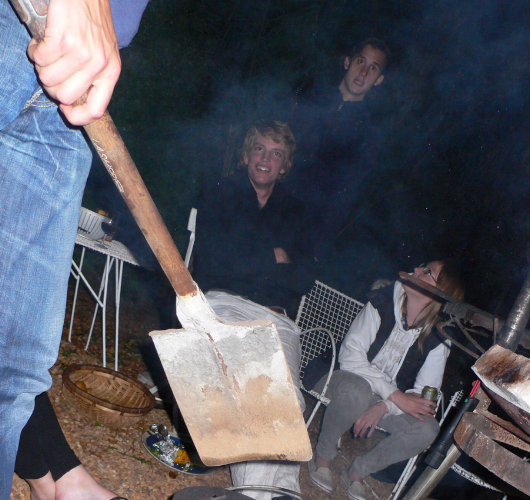
As a long-lingering tradition from Africa’s pre-Christian days, it is also customary for an unsuspecting guest to be murdered with an otherwise conventional shovel and sacrificed to a totem.*
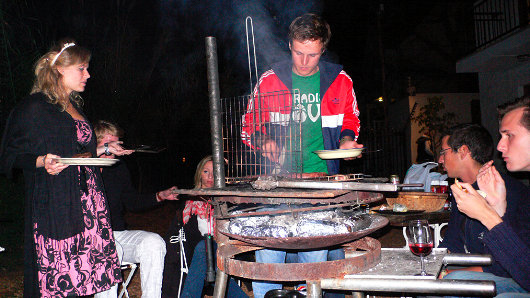
The ritual murder completed, the braaigoers continue their feast, and happiness and joviality reign.
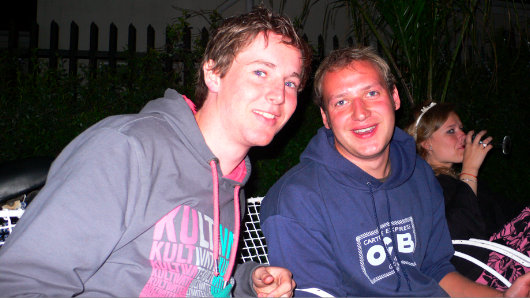
Search
Instagram: @andcusack
Click here for my Instagram photos.Most Recent Posts
- Faithful Shepherd of the Falklands April 8, 2025
- Articles of Note: 8 April 2025 April 8, 2025
- Proportionality Destroys Representation April 8, 2025
- Sag Harbor Cinema March 26, 2025
- Teutonic Takeover March 10, 2025
Most Recent Comments
Book Wishlist
Monthly Archives
Categories



When you’ve been in Argentina, have you tasted an Argentine asado? Is this better? ;)
My dear Mr. Cusack, I’m afraid that your lexicography is askew. What you describe as a “barbecue” is in fact a “cookout,” a general term for a gathering at which meat is cooked over a fire. When unmodified in this fashion, the cookout normally features grilling, the searing of meat over a direct fire, usually indeed charcoal or gas. The barbecue, however, is something else entirely. For the barbecue is a gathering at which meat, preferably pork but possibly beef (see also, “brisket”) is barbecued, or smoked or otherwise indirectly heated over a fire fueled by charcoal and American hardwoods (never gas). The meat thus cooked bears the most common use of the term “barbecue.”
The habit, all too common among inhabitants of the northern United States, of referring to any event featuring a fire as a “barbecue” is simply a bastardization. It undoubtedly reflects the inescapable barbarity of these parts of the country produced by a climate utterly unsuited to cooking over an open fire (or engaging in any other outdoor activity except during brief windows).
So while your fine South African compatriots might have themselves a highly superior form of cookout, whether or not they have a barbecue is a matter much more technical.
A braai stands alone. It has – and needs – no antecedents. It is, however, incomplete without ‘wors’ (boerewors = lit. “farmer sausage”), whatever other meats are being grilled at the function.
Purists believe that braaied meat should be served with “stywe pap en sous” (thick porrige and sauce). Stywe pap is like grits but stodgy; i.e. is not liquid like grits. It needs to be chewed before swallowing. The ‘sous’ is made of tomatoes and onions and flavoured with herbs and spices. It is poured over the ‘pap’.
The smell of borewors cooking on the braai is as compelling and as irresistible as the song of the sirens as one negotiates Scylla and Charybdis. The outcome when one succumbs, however, much more satisfactory in every way.
The best braai fire is somewhat ‘cool’, and there should be no flames that would sear the outside of the meat. I have found if one can hold one’s hand over the coals at about 12″ to 18″ inches for a swift-ish count of about ten, and not be burnt, the coals are about dead-right to start braai-ing.
The chief braaier is, as Andrew says, a male, and is supported by other males who supply him with generous libations as he toils. Ribald jokes are usually told during this process. The braaier’s companions imbibe with him, a process that builds robust camaraderie.
Traditionally the women sit isolated from the men at this time and make caustic comments about them. A few women, some amazingly docile and well-trained considering the age in which we live, get the other food ready.
Once the meat is served to everyone the gender animosity dies away and harmony is restored. Many children have been conceived after braai’s in South Africa, so much is their power to create feelings of well-being, affection and joy.
“Lekker braai, daar onder in die boland, Andrew-julle!”
Mr. Kurtz:
I have a tremendous respect for the asado, but the braai is much more to my taste. Asados are lovely, but I much prefer the boerewors of an braai to the various parts grilled at an asado.
Titus:
I have never even heard of a “cookout”, so I must assume this is a word particular to some regional variant of English not used in New York, or Scotland, or South Africa (those being the English-speaking places I have lived).
Mr. Allen gives a deeper appreciation of a braai than I could provide.
Titus is correct, at least in reference to how the terms barbecue and cookout are used in the South and in Texas. A proper barbecue uses wood and never gas.
My parents are Yankees, and refer to all outdoor cooking as “barbecue”. In the South, where I was born and raised, barbecue is a specific kind of cooking(the kind Titus describes)and its product. All else is known as “cookout”. One of the keys to coastal southern barbecue is the selection of woods used in the smoking pit. Charcoal may be used to start the fire, but hardly ever for cooking. And gas? You might as well go to McDonalds.
While I am not as partisan or fanatical as some Southerners regarding my outdoor cooking terminology, I do observe that some of my Northerner friends are shocked when I introduce them to southern pit barbecue. I say barbecue, they think hamburgers, and I present them with a plate of pulled pork in vinegar sauce.
“I present them with a plate of pulled pork in vinegar sauce.”
Now I’m homesick for Dixie!
Andrew,
Braai-Schbraai! Outdoor cooking by any name or in any clime is nada unless the hosts and guests avail themselves of a generous supply of the local equivalent of “hooch”, as it’s called in the South of the USA (the North American one). The term evolved from “hoochinoo,” a distilled liquor made by the Hoochinoo (Hutsnuwu) Indians, a Tlingit tribe. Even so, it sounds vaguely Afrikaans to me. What’s hooch where you are?
A popular short film on the braai from a few years back. (I’m sure Mr. Cusack is familiar with it.)
http://www.youtube.com/watch?v=GDq5PKzst98